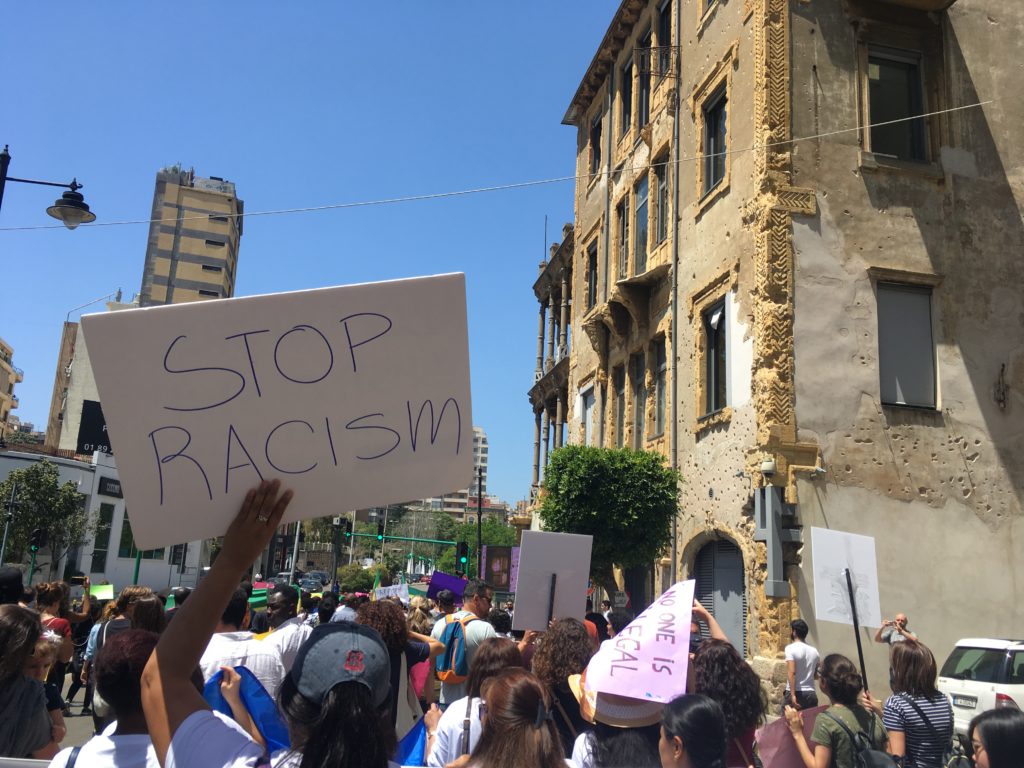Ella Parry-Davies is a researcher working on performance in contexts of transnational migration. She facilitates Home Makers, a collection of sound walks recorded and co-edited with migrant domestic workers in the UK and Lebanon.
Home Makers is shortlisted for the Sound Walk September 2020 Awards.
Here, Ella talks about her piece.
When I wrote to the migrant domestic workers who collaborated on the Home Makers sound walks to tell them we’d been shortlisted for a Soundwalk September Award, I got a flood of 💪🏾 emojis in response. This strong brown arm is the miniature sign of a much bigger feeling. It’s exhilarating to know that the shortlisting felt powerful: as they described, it was because they knew people were listening around the world to what they had to say, because they were acknowledged as creative sound editors, and because we could celebrate our achievement together.
When four women from the Alliance of Migrant Domestic Workers in Lebanon joined a walk · listen · café event to discuss Home Makers, one of them wrote to me afterwards to say that the discussion was “a huge boom for me”. She was surprised to see migrant domestic woarkers’ stories as the “highlight” of a discussion between artists, and although she’d been interviewed by reporters before, the fact that we had edited the recording of our conversation together made her feel a different sense of ownership: “My opinion is, that was one of a kind.”
In her soundwalk one day the kafala system will change, the same collaborator describes how domestic workers live and work “behind closed doors.” This means their employers often feel a sense of impunity, with the kafala (sponsorship) system in several Middle Eastern countries and the comparable tied-visa system in the UK, conducive to exploitation and abuse. It also means they often experience profound loneliness and (to use her word) a sense that they are “invisible.”
Layering the pandemic over the isolation of living with precarious immigration status has worsened conditions for many, as my research shows.
The Home Makers soundwalks aren’t giving migrant domestic workers a voice. The women I have worked with have a voice, and many are using it loudly to campaign for their rights. But the soundwalks open doors between them and listening publics who might never otherwise tune into their worlds. You might pass through London’s Piccadilly Circus and miss a domestic worker sleeping rough after running away from abusive employers. You might take a walk in Beirut’s Sanayeh Gardens and never know what memories it holds for a woman who has given birth to children in hiding because they have no legal right to be in Lebanon.
Why should these stories be told through sound walks?
Claims are often made for the intimacy of walking together, and the solidarity that can arise from sharing a journey. There’s no substitute for sharing a walk.
But sound walks also show us the limits of identification and solidarity. Privileging aurality, a more ambiguous sense, they leave space for the unknown. What happened next? How did that make her feel? Why did she make that choice?
These are questions that even I sometimes don’t have answers to. With both the initial conversation and the editing guided by my collaborators, I have to accept that there are questions I can’t ask, and pieces of the puzzle they would rather not share.
For Sound Walk September listeners, I hope that unanswered questions spark curiosity and political engagement with migrant domestic workers’ struggles that continue after the walks end, and more broadly awaken the sense that we have to listen hard when we don’t command the expertise of others’ experiences.
Not all walkers (myself included) will know what it means to go for a walk when doing so subjects you to police surveillance or force, when it is accompanied by chronic pain, or when it depends on your having the right papers to be present at all.
In some ways, those meanings can never be fully communicated. As Sarah Jane Cervenak writes in Wandering, a book about black feminist philosophy, ‘Because wandering is as much an interior as it is an exterior activity, it at once resists decryption and sustains an unavailable landscape of philosophical desire.’
I hope Home Makers soundwalks leave listeners both wandering and wondering, wherever they are and however they can, two creative practices that never really come to an end.
Thank you for considering our work for an award.
Ella’s discussion of her experience is the ninth in a series of the artists shortlisted for the Sound Walk September 2020 Awards talking about their work.


